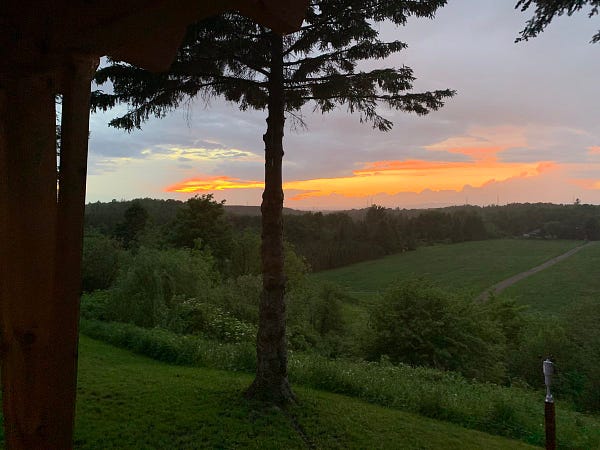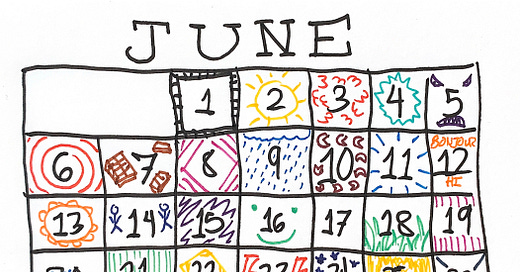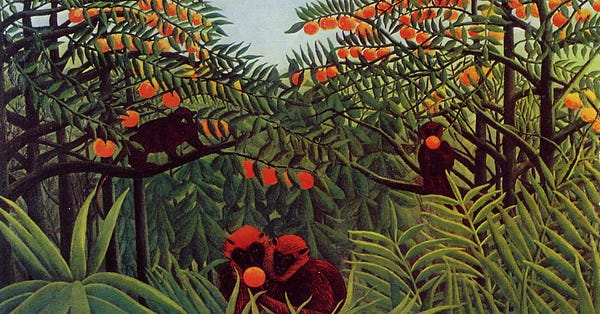The Value of Variety: Daily Life
On our need for novelty and diversity in the experience of being human 🗓
Hello and welcome to issue #30 of Light Gray Matters! A big round number today, that’s always pleasing.
I am typing this from my iPad, which feels weird, but it’s all right, I guess. My computer is undergoing surgery at the Apple store. This circumstance forced my to take a break from most “productive” things I usually spend my time on. Those few days have been quite nice (though now I do want to get a real working keyboard again): I went to the zoo, rediscovered the bliss of road trips, and visited my parents in the countryside near Quebec City.


It turns out I badly needed this break. I feel much better, much more in harmony with myself now compared to a week ago.
Back then, and for the previous couple of weeks, I felt a… wrongness. It wasn’t quite clear what it was. I wasn’t sad, or depressed, or tired, or anything like that. I still felt joy and pleasure. But everything seemed a bit duller than it should have. The world seemed to have lost some of its color. Work, play, and people were all slightly less interesting than usual.
So I can’t describe this feeling very well. Yet both the cause and the remedy were obvious. I needed novelty.
I had no shortage of the opposite pole of this dimension, comfort. My life seemed all good from the outside. But the days were merging into one another. Nothing exciting seemed to be happening. The pandemic (or, more precisely, the restrictions created by the government to control the pandemic) had made a lot of the usual sources of novelty impractical. Many of the sources that remained, like taking a walk or picnicking in a park, I exploited often enough that they weren’t novel anymore.
A few weeks before, I booked a hotel room for no reason and it helped. I felt more clarity in the following couple of days. But a single night out in the same city had only a limited effect. I hope and expect the extended weekend at my parents’ has a longer lasting effect. Novelty, interestingly, is a thing that can be dosed.
And also interestingly, the correct dosage differs from person to person. I know I, for whatever reason, need quite a lot to be satisfied. I’m not sure why. Others seem to be quite happy with stable arrangements — a place to live, a job, the kind of food they eat — that stay the same across decades. Maybe they actually do need as much novelty as I do, but get it in different ways that I don’t see. After all, everyone has preferences. I value diversity particularly in my travels, food, books, music, career, and intellectual interests. Others may value it in clothing, cars, sexual partners, hallucinatory experiences, and so on.
But certainly all of us need some variety in our daily lives.
Why is that?
Let’s bring the economic and the aesthetic arguments again. First, why might variety in daily life be useful instrumentally? How can it economically improve your life?
The answer depends on what you’re trying to optimize for, but for most people this isn’t a hard question — it would be some variation of “happiness” or “quality of life.” To maximize your happiness, you need things and activities and people that make you happy. But the things you currently own, and the activities you currently partake in, and the people currently around you, may not necessarily be those that make you happiest. To find better ones, you need to explore, which is another word for “increasing the diversity of your experiences.”
(I was going to write an example about going to the same restaurant vs. trying new restaurants, but I think you get the point.)
The aesthetic argument is more direct: it is variety itself that increases quality of life. Trying new foods isn’t useful only to discover your next favorite dish; it is good in and of itself.
The next step is to wonder why we find this good. That brings us in the territory of psychology, philosophy, and neuroscience, and I am not qualified to answer. But it does seem that diversity is healthy for cognitive function, which certainly suggests our brains need it, just like we need food and water.
Now, while I am no psychologist, philosopher, or neuroscientist, I do have formal education in evolutionary biology. So no one can stop me from hazarding an evolutionary guess. Here: it possibly made sense for our ancestors to be prepared for all sorts of situations in order to survive, so evolution made us react positively to variety as a way to enrich our repertoire of experiences and better deal with threats. Another evolutionary hypothesis: our need for variety is a consequence of the system that allows us to notice the unusual, like colourful fruit in a green forest. (This is the same system that gave us our ability to see beauty.)
When I write a book about this, I’ll research the evolutionary psychology angle more thoroughly. For now, let it suffice to say that there must be some reason why we enjoy and need variety, both in our daily life and when it comes to the other things we’ve discussed — living beings, culture, people. Either it is adaptive, or it is the consequence of something else that’s adaptive.
Next week, we’ll discuss diversity in more abstract matters: opinions, politics, morality. Until then I remain
Yours in hoping my laptop comes back from its medical procedure in good shape and soon,
Étienne
P.S. I am hosting two Interintellect Salons in the coming weeks! One is the sixth episode of my Ted Chiang book club series, about superintelligence (it’s open to everyone!).
The other is an offshoot for the post I published here on Light Gray Matters about beauty. The evolutionary reasons for our aesthetics are an intriguing puzzle and I’d love to discuss it with you next Friday.






